Young people prefer socialism to capitalism in latest poll
Not surprisingly to anyone who has been following both the news and recent policy debates, young people who four years ago went for Barack Obama's finance capitalist version of audacious hope have turned to socialism over capitalism. Although the polls are notoriously inaccurate guides to what people will do, the numbers are becoming clear as both the economic and moral bankruptcy of the capitalism system, world-wide, and its impact on human beings devastates not only people, but, as has been traditional since the system began in the 18th Century, the very planet upon which we live.
The turnaround in popular consciousness comes despite more than 30 years of ruthless capitalist propaganda. The gimmicks have from a massive attempt at changing of basic vocabulary (e.g., substituting "entrepreneur" for "capitalist"; referring to the exploiters of labor like Mitt Romney and Bain Capital as "job creators" just for starters) to the domination of media by finance capital at a level that had not been seen in the USA for more than 100 years. The substitution of finance capitalist propaganda for "news" in the major media of the USA has not been as complete since the first Gilded Age, of the late 1890s and the early decades of the 20th Century.
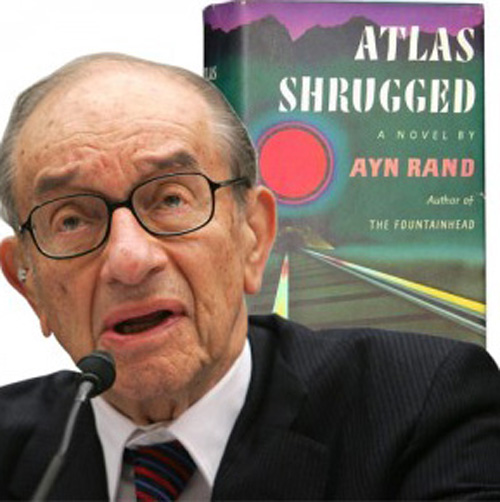 Contrary to the mythology of the 1990s and early 21st Century, former Federal Reserve Chairman Alan Greenspan (above) was less an economist or statistician and more of a theologian of the Ayn Rand version of capitalist ideology. Through successive presidents who embrace (at personal advantage) the Ayn Rand version of "free markets," Greenspan, as America learned too late, promoted a bizarre version of unregulated capitalism that had little or nothing to do with the actual economic studies and theories of classical economists from Adam Smith to Milton Friedman and everything to do with the erotic and mystical beliefs of his mentor, Ayn Rand, under who he studied in the 1950s and early 1960s. One of the smaller aspects of the propaganda attempt to woo both young people and especially the "talented tenth" among the young has been what might be called the "Atlas Shrugged" offensive. Since the early 1990s, teachers at the high school level, especially those teaching advanced placement courses, were provided with unlimited supplies of Ayn Rand's strange novel "Atlas Shrugged," and their students were encouraged to enter "essay contests" which provided the Ayn Rand people with a growing list of the highest scoring high school students, year after year.
Contrary to the mythology of the 1990s and early 21st Century, former Federal Reserve Chairman Alan Greenspan (above) was less an economist or statistician and more of a theologian of the Ayn Rand version of capitalist ideology. Through successive presidents who embrace (at personal advantage) the Ayn Rand version of "free markets," Greenspan, as America learned too late, promoted a bizarre version of unregulated capitalism that had little or nothing to do with the actual economic studies and theories of classical economists from Adam Smith to Milton Friedman and everything to do with the erotic and mystical beliefs of his mentor, Ayn Rand, under who he studied in the 1950s and early 1960s. One of the smaller aspects of the propaganda attempt to woo both young people and especially the "talented tenth" among the young has been what might be called the "Atlas Shrugged" offensive. Since the early 1990s, teachers at the high school level, especially those teaching advanced placement courses, were provided with unlimited supplies of Ayn Rand's strange novel "Atlas Shrugged," and their students were encouraged to enter "essay contests" which provided the Ayn Rand people with a growing list of the highest scoring high school students, year after year.
Much of the Ayn Rand propaganda flopped (the movie version of "Atlas Shrugged", eagerly awaited by Rand devotees, was a disaster). But the accumulation of propagandists for the most ruthless parody of capitalist ideology (Ayn Rand tried to create what amounted to a disciplined Leninist party of capitalist cadre) served the ruling class well for more than a decade. Those best served were especially the finance capitalists (like the "investment bankers" of Goldman Sachs or "raltionship bankers" like Chicago's Rahm Emanuel, who "earned" $18 million on Wall Street thanks to the crony capitalist system he helps promote) who create little or no wealth, but who can make huge sums of money by creating a casino where every game is rigged in their favor.
By the early 21st Century, as each successive capitalist scam bubbled and burst (first, the "Internet Bubble," followed by the "Housing Bubble"), huge amounts of the wealth of the "99 percent" was devoured by the "one percent." Executive salaries by comparison with workers' salaries increase geometrically.
Equally important to the current hegemony of finance capital and its ideology was the promotion of talent at the nation's major universities in the service of finance capital and the nostrums of the "global economy." The most famous celebrity created by that process is Barack Obama, whose career was promoted by a ruling class that realized that by substituting diversity for economic class it could extend its life for a long long time. Like the Mitt Romney who in January 2012 is accused of changing his beliefs to fit the needs of getting elected, Obama, from the beginning of his political rise in Chicago, was putty in the hands of Chicago's wealthiest and most powerful people. The promotion of his slanted memoir "Dreams from My Father," which also increase Obama's wealth almost as much as "relationship banking" increased the personal wealth of Rahm Emanuel, was part of the project of creating what one former Obama aide called "Brand Obama."
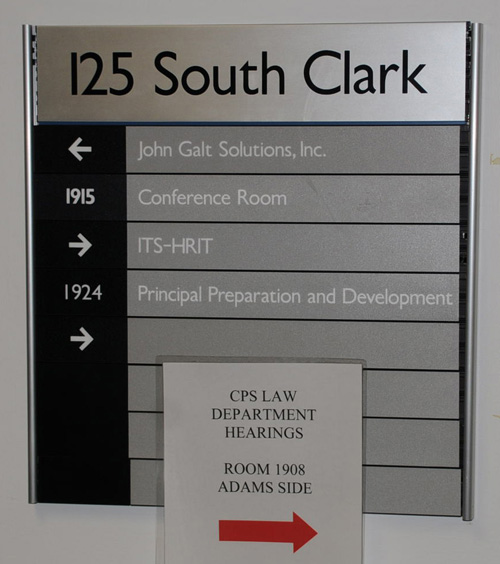 By the time Arne Duncan was installed as "Chief Executive Officer" of Chicago's public schools by Mayor Richard M. Daley in July 2001, one of the offices in the building housing CPS headquarters, rented, was "John Galt Solutions, Inc." an Ayn Rand outfit, located on the 19th floor of 125 S. Clark St. Substance photo by George N. Schmidt. Yet for all the efforts at changing the basic vocabulary of economic reality, the collapse of capitalist propaganda is apparently being hastened. We shall see. Despite all of the declarations that socialism is dead, a growing minority of people, especially the young, see socialism as a more human alternative to the ruthlessly Darwinian races to the top being pushed by both wings of the party of finance capital in the USA, and by candidates from the moderate right (like Barack Obama) to candidates of the extreme right (like Mitt Romney).
By the time Arne Duncan was installed as "Chief Executive Officer" of Chicago's public schools by Mayor Richard M. Daley in July 2001, one of the offices in the building housing CPS headquarters, rented, was "John Galt Solutions, Inc." an Ayn Rand outfit, located on the 19th floor of 125 S. Clark St. Substance photo by George N. Schmidt. Yet for all the efforts at changing the basic vocabulary of economic reality, the collapse of capitalist propaganda is apparently being hastened. We shall see. Despite all of the declarations that socialism is dead, a growing minority of people, especially the young, see socialism as a more human alternative to the ruthlessly Darwinian races to the top being pushed by both wings of the party of finance capital in the USA, and by candidates from the moderate right (like Barack Obama) to candidates of the extreme right (like Mitt Romney).
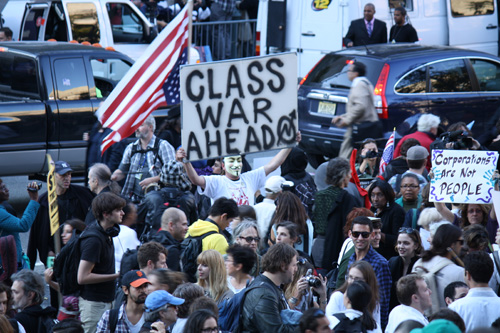 Above, the majority of people in the major Occupy Wall Street demonstration in New York City on October 8, 2011 were young. Substance photo by John Lawhead.Young People More Likely To Favor Socialism Than Capitalism: Pew. REported by Alexander Eichler. The Huffington Post. December 29, 2011
Above, the majority of people in the major Occupy Wall Street demonstration in New York City on October 8, 2011 were young. Substance photo by John Lawhead.Young People More Likely To Favor Socialism Than Capitalism: Pew. REported by Alexander Eichler. The Huffington Post. December 29, 2011
http://www.huffingtonpost.com/2011/12/29/young-people-socialism_n_1175218.html
Young people -- the collegiate and post-college crowd, who have served as the most visible face of the Occupy Wall Street movement — might be getting more comfortable with socialism. That's the surprising result from a Pew Research Center poll that aims to measure American sentiments toward different political labels.
The poll, published Wednesday, found that while Americans overall tend to oppose socialism by a strong margin — 60 percent say they have a negative view of it, versus just 31 percent who say they have a positive view — socialism has more fans than opponents among the 18-29 crowd. Forty-nine percent of people in that age bracket say they have a positive view of socialism; only
43 percent say they have a negative view.
And while those numbers aren't very far apart, it's noteworthy that they were reversed just 20 months ago, when Pew conducted a similar poll. In that survey, published May 2010, 43 percent of people age 18-29 said they had a positive view of socialism, and 49 percent said their opinion was negative.
It's not clear why young people have evidently begun to change their thinking on socialism. In the past several years, the poor economy has had any number of effects on young adults — keeping them at home with their parents, making it difficult for them to get jobs, and likely depressing their earning potential for years to come — that might have dampened enthusiasm for the free market among this crowd.
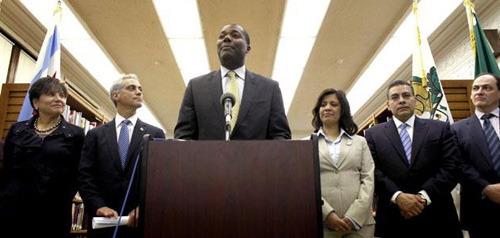 Shortly before his inauguration at Mayor of Chicago, millionaire Rahm Emanuel, who "earned" $18 million as a crony capitalist "relationship banker" on Wall Street during three years in the private sector, announced that he was going to replace the entire Chicago Board of Education and appoint the controversial Superintendent of the Rochester New York public schools as the fourth (or fifth, if an interim is counted) "Chief Executive Officer" of the nation's third largest school system. The announcement, made at Chicago's Kelly High School in April 2011, included the person who would become Brizard's "Chief Education Officer", along with three members of the incoming Board of Education, one of whom (left) was Chicago billionaire Penny Pritzker. Above, left to right, Penny Pritzker (soon to be a school board member), Rahm Emanuel, Jean Claude Brizard, Noemi Donoso, and school board members Jesse Ruiz and Rodrigo Sierra. The above photograph typifies the way Rahm Emanuel's media team arranged what is called "Rahm's Rainbow" to reflect a kind of shallow diversity (homogeneous in class outlook; diverse in racial, ethnic, and gender lines) for the TV cameras, for whom Rahm is always "on."Indeed, the Pew poll also found that just 46 percent of people age 18-29 have positive views of capitalism, and 47 percent have negative views — making this the only age group where support for socialism outweighs support for capitalism.
Shortly before his inauguration at Mayor of Chicago, millionaire Rahm Emanuel, who "earned" $18 million as a crony capitalist "relationship banker" on Wall Street during three years in the private sector, announced that he was going to replace the entire Chicago Board of Education and appoint the controversial Superintendent of the Rochester New York public schools as the fourth (or fifth, if an interim is counted) "Chief Executive Officer" of the nation's third largest school system. The announcement, made at Chicago's Kelly High School in April 2011, included the person who would become Brizard's "Chief Education Officer", along with three members of the incoming Board of Education, one of whom (left) was Chicago billionaire Penny Pritzker. Above, left to right, Penny Pritzker (soon to be a school board member), Rahm Emanuel, Jean Claude Brizard, Noemi Donoso, and school board members Jesse Ruiz and Rodrigo Sierra. The above photograph typifies the way Rahm Emanuel's media team arranged what is called "Rahm's Rainbow" to reflect a kind of shallow diversity (homogeneous in class outlook; diverse in racial, ethnic, and gender lines) for the TV cameras, for whom Rahm is always "on."Indeed, the Pew poll also found that just 46 percent of people age 18-29 have positive views of capitalism, and 47 percent have negative views — making this the only age group where support for socialism outweighs support for capitalism.
Young people have also been among the most involved in the nationwide Occupy movement, whose members have leveled pointed criticism at the capitalist ethos and often called for a more equal distribution of American wealth.
In general, income inequality — which a Congressional Budget Office report recently pointed out is at historic levels — has received more and more attention in politics and the media since the Occupy movement launched in mid-September. Usage of the term rose dramatically in news coverage following the start of the protests, and politicians from Senate Majority Leader Harry Reid to President Barack Obama have used the movement's language to describe divisions in the
American public.
Still, the nationwide Occupy demonstrations notwithstanding, socialism doesn't score very well in
other age groups in the Pew poll, or across other demographic categories.
Pew broke down its results by age, race, income and political affiliation, as well as support for the Occupy Wall Street and Tea Party movements. There were only two other groups among whom socialism's positives outweighed its negatives — blacks, who say they favor socialism 55 to 36 percent, and liberal Democrats, who say they favor socialism 59 to 39 percent. These were also the only two groups to show net favor for socialism in the 2010 poll.
DESCRIPTION OF THE PEW POLLING FROM DECEMBER 2011.
(2) Little Change in Public's Response to 'Capitalism,' 'Socialism'. A Political Rhetoric Test
Pew Research Center for the People & the Press
December 28, 2011. http://www.people-press.org/2011/12/28/little-change-in-publics-response-to-capitalism-socialism
Overview
The recent Occupy Wall Street protests have focused public attention on what organizers see as the excesses of America's free market system, but perceptions of capitalism - and even of socialism - have changed little since early 2010 despite the recent tumult.
The American public's take on capitalism remains mixed, with just slightly more saying they have a positive (50%) than a negative (40%) reaction to the term. That's largely unchanged from a 52% to 37% balance of opinion in April 2010.
Socialism is a negative for most Americans, but certainly not all. Six-in-ten (60%) say they have a
negative reaction to the word; 31% have a positive reaction. Those numbers are little changed from when the question was last asked in April 2010.
Of these terms, socialism is the more politically polarizing - the reaction is almost universally negative among conservatives, while generally positive among liberals. While there are substantial differences in how liberals and conservatives think of capitalism, the gaps are far narrower. Most notably, liberal Democrats and Occupy Wall Street supporters are as likely to view capitalism positively as negatively. And even among conservative Republicans and Tea Party supporters there is a significant minority who react negatively to capitalism.
These are among the findings of the latest national survey by the Pew Research Center for the People & the Press, conducted Dec. 7-11, 2011 among 1,521 adults that tests reactions to words frequently used in current political discourse. Another term in the news, libertarian, continues to receive a mixed public reaction: 38% have a positive view, 37% negative, and nearly a quarter (24%) have no opinion either way.
Interestingly, some of the most positive views of libertarianism come from groups on both the left and the right of the political spectrum. People who agree with the Tea Party movement see libertarianism positively by a 51% to 36% margin, as do liberal Democrats by a 47% to 32% margin. And while the word libertarian receives a very positive reaction from younger Americans, older people tend to view it negatively.
Both of the ideological descriptions used most frequently in American politics - conservative and
liberal - receive more positive than negative reactions from the American public. But the positives for conservative (62%) are higher than for liberal (50%). This gap mainly reflects the balance of what people call themselves; more people consistently call themselves conservative than liberal in public opinion polling. Those who think of themselves as politically "moderate" give similarly positive assessments to both words.
As many Democratic strategists have argued, the term progressive receives a far more positive reaction from the American public than the term liberal (67% vs 50%), though the difference is primarily among Republicans.
`Socialism' and `Capitalism'
The term capitalism elicits more positive (50%) than negative (40%) reactions from the American public, but not by much. And while Americans of different incomes and ideological perspectives offer different opinions on capitalism, the divides are not as wide as on other terms measured.
More affluent Americans, as well as conservative Republicans, are more likely to offer positive than negative reactions to capitalism by two-to-one. And among people who agree with the Tea Party movement, 71% view capitalism positively. Yet within each of these groups, a quarter or more say they have a negative reaction to capitalism.
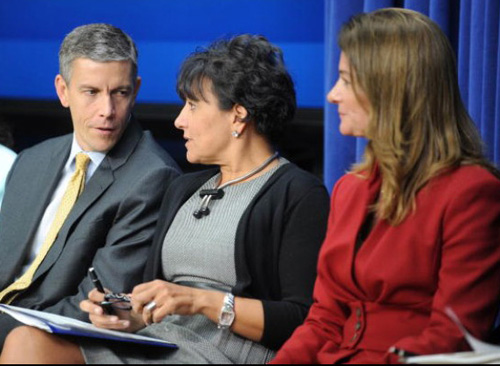 Although the Republican (George W. Bush) version of corporate school reform — "No Child Left Behind" — was controversial, since the election of Barack Obama President in 2008, the Democratic Party version ‚ "Race to the Top" — has been even more Darwinian, but less subject to critique by many so-called "progressives." Under U.S. Secretary of Education Arne Duncan, the Obama administration has pursued a ruthless program based on eugenics theories and the promotion of privatization, union busting, charter schools, and individual competition (as opposed to cooperation). Above, at a White House summit on community colleges in October 2010, are Arne Duncan, Chicago billionaire Penny Pritzker, and Seattle billionaire Melinda Gates, who runs the Bill and Melinda Gates Foundation with her husband to dictate American education policy.Notably, liberal Democrats and supporters of the Occupy Wall Street movement are not overtly critical of capitalism. In fact, as many offer positive as negative reactions in each of these groups.
Although the Republican (George W. Bush) version of corporate school reform — "No Child Left Behind" — was controversial, since the election of Barack Obama President in 2008, the Democratic Party version ‚ "Race to the Top" — has been even more Darwinian, but less subject to critique by many so-called "progressives." Under U.S. Secretary of Education Arne Duncan, the Obama administration has pursued a ruthless program based on eugenics theories and the promotion of privatization, union busting, charter schools, and individual competition (as opposed to cooperation). Above, at a White House summit on community colleges in October 2010, are Arne Duncan, Chicago billionaire Penny Pritzker, and Seattle billionaire Melinda Gates, who runs the Bill and Melinda Gates Foundation with her husband to dictate American education policy.Notably, liberal Democrats and supporters of the Occupy Wall Street movement are not overtly critical of capitalism. In fact, as many offer positive as negative reactions in each of these groups.
By contrast, socialism is a far more divisive word, with wide differences of opinion along racial, generational, socioeconomic and political lines. Fully nine-in-ten conservative Republicans (90%) view socialism negatively, while nearly six-in-ten liberal Democrats (59%) react positively. Low-income Americans are twice as likely as higher-income Americans to offer a positive assessment of socialism (43% among those with incomes under $30,000, 22% among those earning $75,000 or more).
People under age 30 are divided in their views of both capitalism and socialism. But to Americans age 65 and older, socialism is clearly a negative (72%), not a positive (13%), term. Mixed Views of `Libertarian'
The American public remains divided over the word libertarian, with 38% offering a positive reaction, 37% a negative reaction, and 24% offering that they don't have a reaction either way.
The steepest divide in reactions to the term libertarian
are not political but generational. By a 50% to 28%
margin, people under age 30 have more positive than
negative feelings toward the term libertarian. Views are
more split among those age 30-64, while those age 65 and
older offer more negative (43%) than positive (25%)
reactions.
Overall, there is only a small partisan divide when it
comes to views of libertarianism - Republicans offer
slightly more negative reactions than do Democrats or
independents (45% vs. 35% and 37%, respectively).
Independents have more positive reactions (44%) than
either Republicans (34%) or Democrats (36%).
Liberal Democrats offer relatively positive assessments
of libertarianism - 47% have a positive reaction and
just 32% have a negative reaction. This is matched by
the positive ratings among people who agree with the Tea
Party movement - by a 51% to 36% margin they react
positively to the word libertarian. `Conservative' and `Liberal'
Republicans see the terms conservative and liberal in
particularly stark terms. By an 89% to 8% margin they
view the former positively, and by a 70% to 20% margin
they view the latter negatively. Democrats are not as
universal in their views. By a 68% to 22% margin they
have a positive reaction to the word liberal, and at the
same time they are equally likely to have a positive as
a negative reaction to the word conservative (47% vs.
44%).
There is a sharp difference by age when it comes to the
word liberal - while 61% of people under age 30 react
positively, just 34% of those age 65 and older say the
same. By contrast, reactions to the word conservative
are almost identical across all age groups.
Public reactions to the word progressive are far more
favorable than to the word liberal; two-thirds have a
positive reaction to the former compared with just half
for the latter. There is very little difference among
Democrats - who view both terms favorably. The largest
difference is among Republicans most (55%) of whom have
a positive reaction to the word progressive, and a
negative (70%) reaction to the word liberal.
About the Survey
The analysis in this report is based on telephone
interviews conducted December 7-11, 2011 among a
national sample of 1,521 adults, 18 years of age or
older, living in all 50 U.S. states and the District of
Columbia (914 respondents were interviewed on a landline
telephone, and 607 were interviewed on a cell phone,
including 284 who had no landline telephone). The survey
was conducted by interviewers at Princeton Data Source
under the direction of Princeton Survey Research
Associates International. A combination of landline and
cell phone random digit dial samples were used; both
samples were provided by Survey Sampling International.
Interviews were conducted in English and Spanish.
Respondents in the landline sample were selected by
randomly asking for the youngest adult male or female
who is now at home. Interviews in the cell sample were
conducted with the person who answered the phone, if
that person was an adult 18 years of age or older. For
detailed information about our survey methodology, see
http://people-press.org/methodology/
The combined landline and cell phone sample are weighted
using an iterative technique that matches gender, age,
education, race, Hispanic origin, region, and population
density to parameters from the March 2010 Census
Bureau's Current Population Survey. The sample also is
weighted to match current patterns of telephone status
and relative usage of landline and cell phones (for
those with both), based on extrapolations from the 2010
National Health Interview Survey. The weighting
procedure also accounts for the fact that respondents
with both landline and cell phones have a greater
probability of being included in the combined sample and
adjusts for household size within the landline sample.
Sampling errors and statistical tests of significance
take into account the effect of weighting. The following
table shows the sample sizes and the error attributable
to sampling that would be expected at the 95% level of
confidence for different groups in the survey:
Sample sizes and sampling errors for other subgroups are
available upon request.
In addition to sampling error, one should bear in mind
that question wording and practical difficulties in
conducting surveys can introduce error or bias into the
findings of opinion polls.

